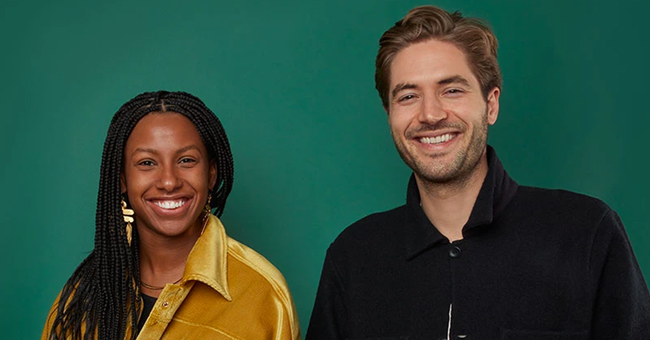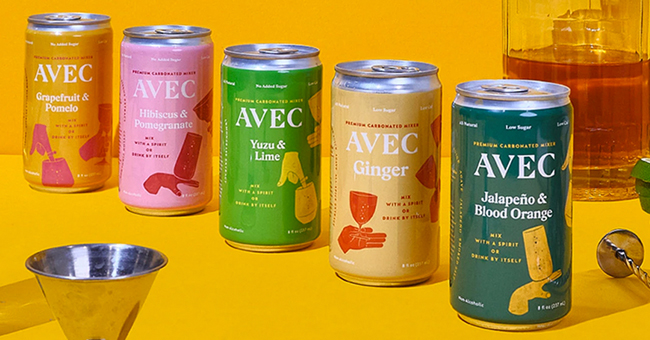As consumers’ cravings for quality cocktails continue to grow, New York-based startup AVEC is hoping to bring a premium experience to the market with its line of better-for-you sparkling mixers.
Founded in 2020, AVEC produces a line of canned mixers that are low in sugar (0-4 grams per 8 oz. can) and made with real juice, natural botanicals and no preservatives or concentrates. The sparkling drinks are available in Ginger, Grapefruit & Pomelo, Hibiscus & Pomegranate, Jalapeno & Blood Orange, and Yuzu & Lime varieties. The products are sold online for $36 per 12-pack, or $45 for a 15-can sampler pack with three of each flavor.
The company was co-founded last year by Alex Doman, a former analyst and investor in companies such as reusable water bottle brand Ocean Bottle and U.K.-based website Obby, and Denetrias ‘Dee’ Charlemagne, whose marketing and publishing background includes serving as director of partner strategy at Joan Creative. The duo came together at Columbia Business School where they developed the concept for AVEC after noticing a rise in premium spirits but a lack of quality canned mixers on the market.
“Volume sales of alcohol are flat, but value is going up,” Doman said. “Everyone’s trading up to single-source origin and other higher quality spirits, and the thought that you’d be mixing kind of the same old rubbish — orange juice, full sugar tonic water, etc. — with these more premium spirits was kind of ridiculous. It is sort of a ‘jumping the shark’ moment.”
Launching into the pandemic last spring, AVEC primarily targeted online direct-to-consumer sales to start. Today, 75% of the brand’s sales are still through ecommerce, but the company has begun focusing more on wholesale, Doman said, with both retail and food service as key channels. AVEC has partnered with distributors including Baldor Specialty Foods in New York and Martignetti in New England. While the company is “still in the testing phase,” he added that the brand will focus on the Northeast to start before branching out into the Midwest and South.
In addition to the founders, the company currently has a full time brand and community manager and freelance heads of sales and operations working between two and four days a week, Damon added.
AVEC is now in the process of closing a pre-seed funding round, Charlemagne said, which will help the company to further expand production and operations. To date, the company has raised money from friends and family, as well as financing the brand through grants and incubator programs such as XRC Labs. AVEC also received a five-figure investment from The Seed Project, an angel group that Doman met via a business school connection, and has brought on individual investors and advisors with CPG industry experience.
Last month, the brand was named a finalist in pop star Pharrell Williams’ Black Ambition program, which provides mentorship and financing for Black and Latino-owned startups. As a finalist the brand was eligible for one of the top prizes (ranging from $100,000 to $1 million). Charlemagne, noted that AVEC has emphasized diversity in its creative and operations and currently about 90% of the full-time team is composed of women, people of color and/or members of the LGBTQ community.

While the idea to launch a refined canned mixer in the U.S. began when premium options in the market were limited, AVEC is now rolling out in a period where mixers are seeing a boost fueled by the pandemic-mandated shift towards at-home drinking occasions. According to SPINS, mixer sales were up 35.4% last year ($404.9 million in MULO for the 52-week period ending January 14) and leading independent brands such as Q Drinks and Fever Tree saw even more robust double digit growth. In February, PepsiCo entered the space with Neon Zebra, a new brand of cocktail mixers sold in 7.5 oz. cans targeting mainstream consumers, while one month later Health-Ade made its own extension into the space with a line of kombucha-based mixers targeting the natural channel. Independent brand Owen’s Craft Mixers has also emerged as a rising name in the segment, having closed a $7.5 million funding round in May.
Doman noted that the rise of RTD cocktails and hard seltzers has also presented another opportunity for AVEC, with brands like White Claw in particular helping drive “better-for-you drinking” trends that the company has emphasized. As AVEC seeks to educate consumers on “elevated” alcohol occasions, RTD cocktails could also help open the door for brands focused on more complex flavor profiles and premium ingredients.
As it aims to make a name for itself in a fast-crowding category by leaning into creative connections, Charlemagne said, AVEC’s marketing has primarily relied on PR and brand partnerships to date. Now, it’s preparing to launch a marketing partnership with a to-be-announced fashion brand in 2022 and also hopes to collaborate with various spirits brands (alcoholic and non-alc) to help drive brand awareness and trial.
“We’re trying to play more in the art space,” Charlemagne said. “[The name] AVEC means “with” in French and it kind of has that 1920s excitement and decadence and we say we pair that with the updated spirit of today, but it kind of has that energy where we try to keep the creative kind of fresh and new and not just mimicking what the big guys do.”
